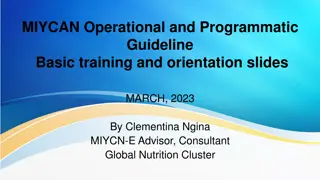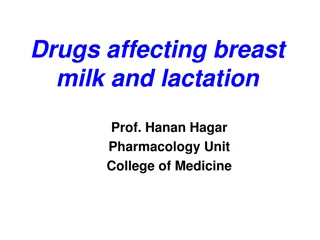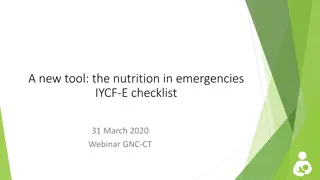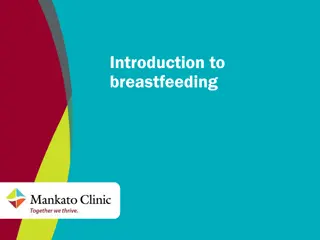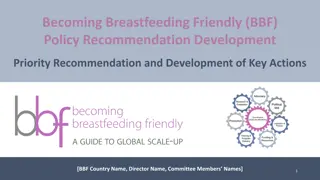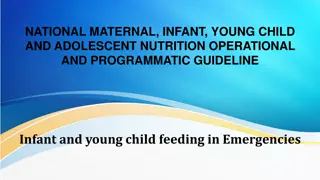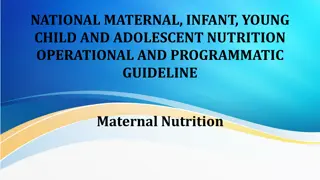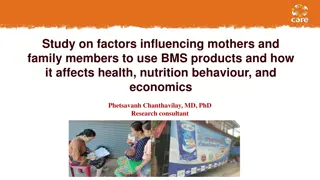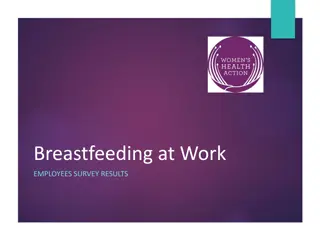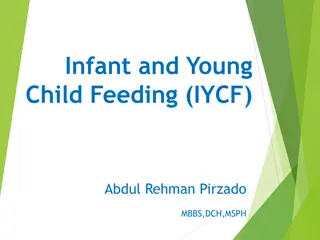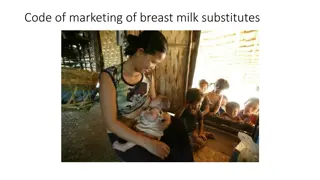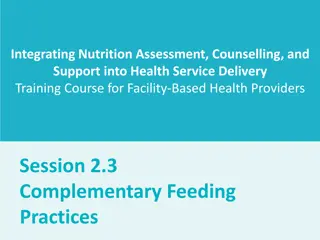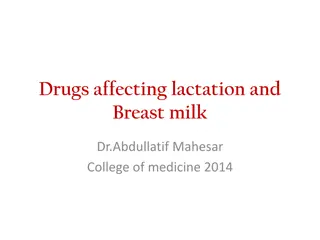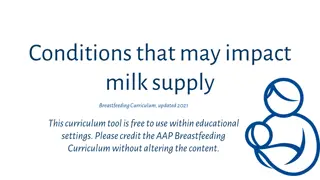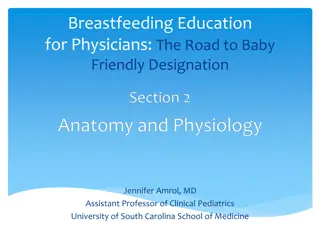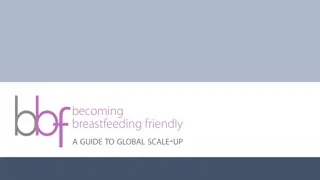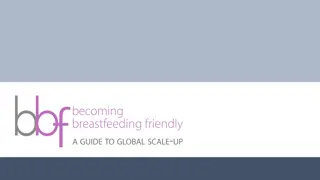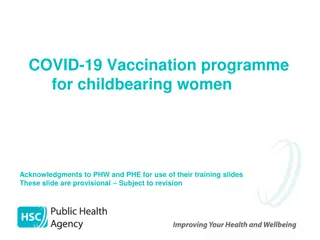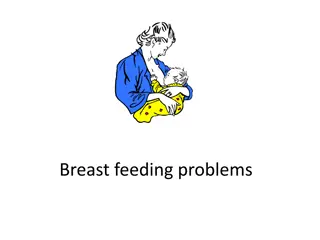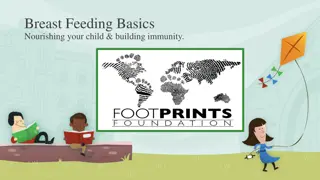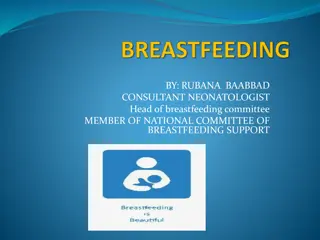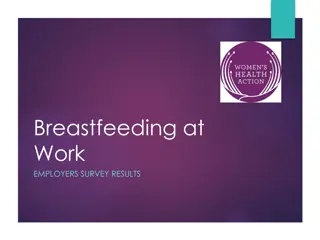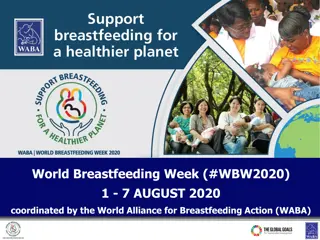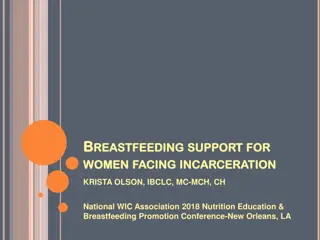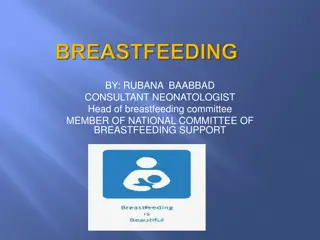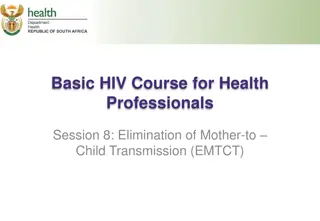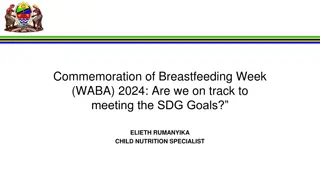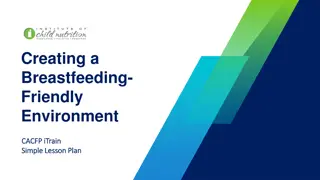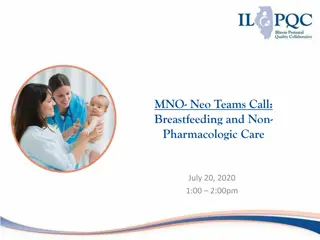Mentorship Training for Breastfeeding Counselling Program
This mentorship training program aims to equip mentors with the skills and knowledge needed to be effective clinical mentors in a breastfeeding counselling program. Participants will learn about mentorship structure, clinical mentoring, strategies, building relationships with mentees, effective comm
1 views • 128 slides
Improving Maternal and Child Nutrition in Somalia: Challenges and Solutions
Addressing the nutritional challenges faced by women and children in Somalia, including high rates of anemia, inadequate breastfeeding practices, and malnutrition. Factors contributing to malnutrition such as poor diets, limited access to essential services, and gender inequalities are highlighted.
0 views • 12 slides
Debunking Breastfeeding Myths: Separating Fact from Fiction
Explore common breastfeeding myths and misconceptions in this interactive guide. Learn the truth behind statements like malnourished mothers can't breastfeed, stress affects milk production, and babies need extra fluids. Understand why it's crucial for mothers to continue breastfeeding during diarrh
1 views • 22 slides
Understanding Drugs and Lactation: Pharmacological Considerations in Breastfeeding
Learn about the impact of various medications on breast milk and lactation, including identifying adverse effects on babies, safe medication choices for breastfeeding women with specific conditions, drugs affecting lactation, and pharmacokinetic changes in pediatric populations.
0 views • 43 slides
Healthy and Happy Families Social Media Strategy 2021 in Myanmar
Healthy and Happy Families (HHF) in Myanmar leverages Facebook as its main social media platform to disseminate knowledge on optimal breastfeeding, complementary feeding, maternal nutrition, and dietary practices. By engaging with a diverse target audience, HHF aims to promote a breastfeeding-suppor
0 views • 17 slides
Supporting Optimal Nutrition Practices during Emergencies: IYCF-E and COVID-19 Technical Brief
In the context of the COVID-19 pandemic, it is crucial to protect, promote, and support appropriate Infant and Young Child Feeding (IYCF) practices. This includes maintaining respiratory hygiene during feeding, emphasizing handwashing, and promoting breastfeeding with necessary precautions. The IYCF
0 views • 11 slides
Understanding the Importance of Iodine Supplementation for Pregnancy and Breastfeeding
Iodine is an essential mineral crucial for thyroid function and preventing birth defects like cretinism. It is found in varying amounts in soil, iodized salt, seafood, and certain foods. Iodized salt contains 400 micrograms of iodine per teaspoon. Daily iodine requirements differ based on age and li
0 views • 13 slides
The Importance of Breastfeeding: Benefits for Mom and Baby
Breastfeeding is crucial for the health and well-being of both mothers and babies. It is recommended to exclusively breastfeed for the first six months and continue with complementary foods in the following months. Breastfeeding provides numerous benefits, from antibodies in colostrum to long-term h
0 views • 38 slides
Developing Breastfeeding Friendly Policy Recommendations
Developing a Breastfeeding Friendly (BBF) Policy involves prioritizing key actions, assessing recommendation effectiveness, affordability, and feasibility. The process includes meetings to identify priority recommendations and propose actions accordingly. Key recommendations, accompanied by proposed
1 views • 9 slides
Infant and Young Child Feeding in Emergencies: Operational Guidelines
Infant and Young Child Feeding in Emergencies (IYCF-E) focuses on protecting and supporting safe feeding practices for infants and young children during all types of emergencies to reduce mortality and morbidity risks. Key actions include developing policies, training staff, coordinating operations,
4 views • 10 slides
Enhancing Breastfeeding Rates Through Quality Improvement Initiatives
Explore strategies for improving breastfeeding rates through quality improvement projects in this informative presentation. Learn how to effectively present data, utilize visualization techniques, and engage stakeholders in promoting breastfeeding practices. Discover the impact of home visiting serv
0 views • 18 slides
Maternal Nutrition Guidelines for Optimal Health Before and During Pregnancy
Recommended maternal nutrition practices play a crucial role in preventing nutrition deficiencies in both mothers and infants, improving fetal outcomes, and reducing morbidity and mortality rates. Preconception care emphasizes the provision of health interventions to women and couples before concept
0 views • 14 slides
Enhancing Maternal and Infant Nutrition through Counseling
Maternal Nutrition Counseling is crucial for supporting pregnant and breastfeeding women, especially adolescents and those at-risk groups, to adopt and maintain positive practices. Skilled Breastfeeding Counseling plays a vital role in empowering women to breastfeed successfully by addressing challe
0 views • 31 slides
Factors Influencing BMS Use and its Impact on Health and Nutrition Behavior in Laos
Study conducted by Phetsavanh Chanthavilay, MD, PhD, focuses on factors influencing mothers and families to use BMS products in Laos and how this impacts health, nutrition behavior, and economics. The research aims to provide insights into the low exclusive breastfeeding rates and the challenges fac
0 views • 16 slides
Breastfeeding at Work: Employees Survey Results
Women's Health Action surveyed 527 women on their experiences of breastfeeding or expressing in the workplace. Most women managed breastfeeding and working by expressing before or after work, with 8 out of 10 respondents indicating some level of workplace support for breastfeeding mothers. Positive
1 views • 13 slides
Global Impact of Infant and Young Child Feeding (IYCF) Strategies
Global strategies like Infant and Young Child Feeding (IYCF) developed by WHO and UNICEF aim to address the high mortality rates among children under 5 due to malnutrition. The strategies emphasize the importance of appropriate feeding practices during pregnancy, lactation, and early childhood to co
0 views • 14 slides
Importance of Breastfeeding and Marketing Regulations
Breastfeeding provides numerous benefits for both infants and mothers, including optimal nutrition, reduced risk of infections, and lower chances of developing diseases like breast and ovarian cancer. The International Code of Marketing of Breast-milk Substitutes aims to regulate the promotion of al
0 views • 18 slides
Integrating Nutrition Assessment and Counselling: Complementary Feeding Practices
This training course focuses on educating facility-based health providers on complementary feeding practices, emphasizing the importance of introducing solid foods along with breastfeeding at 6 months. The session covers topics like nutrition gaps in breast milk, optimal feeding principles, and util
0 views • 48 slides
Understanding Drugs and Lactation in Breastfeeding Mothers
Drugs can impact lactation and breast milk, affecting the health of both the mother and her baby. Factors such as drug passage into milk, effects on milk production, and drug safety during lactation need to be considered. The permeability of breast alveolar cells can vary, influencing drug transfer
0 views • 18 slides
Impact of Conditions on Milk Supply: Breastfeeding Curriculum Update 2021
Explore the potential impact of various conditions on milk supply in breastfeeding. Understand the likelihood and possibilities related to factors such as breast surgery, irradiation, trauma, and more. Utilize the updated 2021 AAP Breastfeeding Curriculum for educational purposes. Acknowledgment to
0 views • 4 slides
Supportive Family Roles in Exclusive Breastfeeding Awareness Campaign
This campaign features radio spots showcasing the importance of exclusive breastfeeding in the first six months of a baby's life. Grandmothers, aunts, and fathers play key supportive roles in ensuring proper nutrition and care for the baby. Messages emphasize the benefits of breastfeeding and balanc
0 views • 5 slides
Breastfeeding Education for Physicians: The Road to Baby-Friendly Designation
Explore the anatomy and physiology of breastfeeding, including the composition of human milk and individual components. Delve into breast anatomy, mammary tissue, alveoli, ducts, nipple and areola structure, and how inverted nipples can still allow for breastfeeding with appropriate assistance. Lear
0 views • 60 slides
Insights on Breastfeeding Throughout History and Modern Practices
Explore the evolution of breastfeeding practices from historical perceptions to modern approaches, emphasizing the importance of education and support for successful breastfeeding. Insights from key figures and contemporary principles like Biological Nurturing and Laid-back Breastfeeding are highlig
0 views • 23 slides
Comprehensive Breastfeeding Training Program for Health Care Professionals
This presentation covers a detailed review of health provider schools and pre-service education programs focusing on breastfeeding topics for professionals caring for mothers, infants, and young children. It assesses the adequacy of budget allocation, hands-on training for facility-based and communi
0 views • 27 slides
Breastfeeding Advocacy Gear Meeting 3 Findings
The presentation highlights key findings from the Breastfeeding Advocacy Gear Meeting 3, discussing major events drawing media attention to breastfeeding issues, high-level advocates promoting breastfeeding, a national advocacy strategy based on research, and the existence of cohesive networks to in
0 views • 14 slides
Transforming Liverpool John Moores into a Breastfeeding-Friendly University
Liverpool John Moores University has initiated a comprehensive program to support breastfeeding mothers among its staff and students. With a focus on staff engagement and improving the overall experience, LJMU has established designated breastfeeding rooms across its campuses, providing essential fa
0 views • 10 slides
COVID-19 Vaccination Programme for Childbearing Women - Educational Slides and Key Messages
This presentation focuses on the COVID-19 vaccination programme for childbearing women, providing information on learning objectives, key messages, and current vaccination programmes for pregnant and breastfeeding women. It discusses the understanding of COVID-19 symptoms, the importance of vaccinat
0 views • 24 slides
Breastfeeding Common Problems and Solutions
Breastfeeding can present various challenges such as latching issues, cracked nipples, engorgement, mastitis, low milk supply, thrush, and inverted nipples. Effective strategies include proper positioning, soothing gel pads, hand-expressing milk, antibiotics, frequent nursing, antifungal treatment,
0 views • 9 slides
Breastfeeding Basics: Nourishing Your Child and Building Immunity
Breastfeeding provides numerous benefits for both the baby and mother, including optimal nutrition, antibodies for immunity, weight management, bonding time, and lower risk of diseases. Learning about proper latching techniques, milk production, positions for breastfeeding, and understanding the ben
0 views • 17 slides
Comprehensive Guide to Breastfeeding for New Mothers
Breastfeeding is the optimal way to nourish infants, providing over 200 essential components for their health and development. This guide covers the definitions, benefits, techniques, and advantages of breastfeeding for both mothers and babies. From establishing milk supply to maintaining health out
0 views • 16 slides
Breastfeeding Support in the Workplace: Employers Survey Results
Employers were surveyed on their practices and attitudes towards breastfeeding in the workplace, with most workplaces offering support for breastfeeding employees. However, a notable percentage of respondents were unaware of relevant legislation and believed better support could be provided without
0 views • 10 slides
World Breastfeeding Week 2020: Promoting Sustainable Solutions for People and Planet
The World Alliance for Breastfeeding Action (WABA) coordinates the annual World Breastfeeding Week campaign, aligning it with the UN Sustainable Development Goals. The WBW-SDGs Campaign focuses on the interconnected nature of breastfeeding and planetary health, emphasizing the role of breastfeeding
0 views • 18 slides
Supporting Incarcerated Women in Breastfeeding
This content focuses on the importance of supporting breastfeeding among incarcerated women, highlighting the challenges they face and ways to advocate for optimal outcomes. It shares the journey of a family separated by incarceration and emphasizes the need for collaboration with professionals in t
0 views • 29 slides
The Importance of Breastfeeding for Infants and Mothers
Breastfeeding is crucial for infants as it provides over 200 components essential for growth and development. It offers numerous health benefits, helps in postpartum recovery, reduces the risk of various diseases, and promotes bonding between mother and child. For mothers, breastfeeding aids in weig
0 views • 18 slides
Essential Information for Elimination of Mother-to-Child Transmission (EMTCT) in HIV
This session covers comprehensive guidance on managing HIV-infected pregnant women throughout preconception, antenatal, labor, and postnatal periods. It includes information on testing algorithms, ART initiation, viral load monitoring, prophylaxis for HIV-exposed infants, and the importance of breas
0 views • 46 slides
Lac Courte Oreilles Mino Maajisewin Home Visitation Program Overview
The Lac Courte Oreilles Mino Maajisewin Home Visitation Program, part of the Family Foundations Home Visiting network in Wisconsin, provides voluntary, intensive, and long-term home visitation services focusing on supporting parent-child interactions. The program serves families from a Federally Rec
0 views • 8 slides
Breastfeeding Trends and Progress Towards SDG Goals: WABA Commemoration 2024
Breastfeeding, a vital practice for infant health and development, is the focus of the 2024 World Alliance for Breastfeeding Action (WABA) Commemoration. Optimal breastfeeding practices, including early initiation, exclusive breastfeeding, and continued support, are essential for child nutrition and
0 views • 12 slides
Creating a Breastfeeding-Friendly Environment Lesson Plan
Explore the importance of creating a breastfeeding-friendly environment in child care settings. Learn about the benefits of breastfeeding, how to support mothers onsite, establishing breastfeeding policies, and more through engaging activities and discussions in this comprehensive training session.
0 views • 18 slides
Neonatal Care Initiative Meeting Highlights
Neonatal care initiative meeting highlights the focus on improving breastfeeding rates, reducing pharmacologic treatment, and enhancing discharge planning for optimal care of infants. The aim is to achieve key performance measures statewide, emphasizing the importance of non-pharmacologic care proto
0 views • 29 slides
Urgent Call to Action: Achieving Compliance with the International Code of Marketing of Breast-milk Substitutes
The Call to Action urges the baby food sector to fully comply with the International Code of Marketing of Breast-milk Substitutes by 2030 to promote optimal breastfeeding practices. It highlights the critical need to address barriers such as formula marketing that hinder breastfeeding rates globally
0 views • 25 slides

